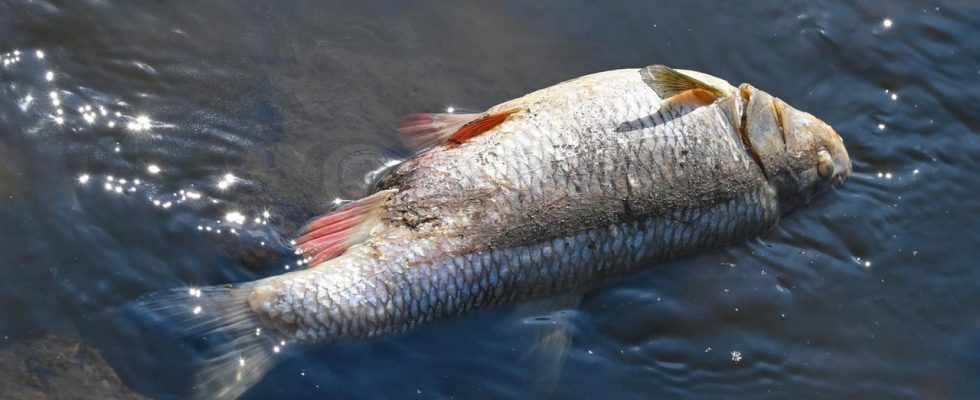No fish in sight and the canal also seems dead. Anglers have once again found dead fish floating on the surface near the Oder. Is the government doing enough to protect the river?
Take the boat up the Oder and turn left into the Gleiwitz Canal. Grzegorz Marcinkiewicz controls and films. He is an angel influencer. His videos get several hundred thousand views on YouTube – even if it has hardly been about catching fish for months, but mainly about the Oder. Next to the rudder, Marcinkiewicz has installed a small monitor, a sonar.
With it he could find the smallest details in the water. “If a tire is buried in the mud on the bottom, I can see it with the sonar,” but the water is “completely empty,” explains the angel influencer.
No fish, the canal seems dead. And in April, Marcinkiewicz again found dead fish floating on the surface nearby. The water is deadly for the fish. The big mining companies, the mines, are mainly to blame, he says. And the government is doing nothing to protect the Oder.
search for solutions
That’s not entirely true, because a hearing on the situation on the Oder will be held in Warsaw at the beginning of July at Poland’s Supreme Control Chamber. Also invited is Agnieszka Kolada from the State Institute for Environmental Protection. She reports on three experiments in which substances were added to the water to combat the deadly algae.
According to Kolada, all three substances “lead to relatively satisfactory results” but only to a limited extent and for a short time. Both the “Primnesium Parvum algae” and the poison came back very quickly.
A solution for the whole ecosystem Or don’t be. According to media reports, the substances are iron chloride, bentonite clay and hydrogen peroxide. According to the invited experts, desalination plants are theoretically conceivable, but will hardly be implemented in the next few years.
Lots of obstacles
There have even been attempts in this direction, explains fishing expert Bogdan Wziatek from the University of Warmia-Masuria. But they were hired because many things had been left out of convenience. Desalination increases the cost of coal production – it’s not profitable. “In 2002, a desalination plant on the Rudna River was almost completely shut down. The Minister of Economics at the time had determined that it would make coal production too expensive,” explains Wziatek.
Aside from the question, fishing expert Wziatek says the saltwater wave that came down the Oder last summer alone was about 30 million cubic meters. Desalinating that and disposing of the industrial salt in turn entails completely different problems.
demands for more protection
A day later, Greenpeace Polska demonstrated in front of the Sejm, the parliament in Warsaw. Inside, a law to protect the Oder is being discussed. But nobody wants to touch the saltwater discharges from industry either, says Marta Gregorzyk from Greenpeace.
“The law doesn’t address the real problems at all: namely, that the Oder is being salted all the time with sewage from the hard coal mines. Instead, there are chapters on the further expansion of the Oder. We call the law: concrete and salt, because that’s it essentially.” A demonstrator presents bread and salt on a tray to MPs hurrying past – the loaf of bread is made of concrete.
Whole ecosystem is affected
Andrzej Swietach has also come from the Angling Club in Wroclaw. He explains that monitoring, surveillance and removing the dead fish is too late. “It’s not just the fish that die, but the entire ecosystem. Everything is linked together as a food chain.”
The winter could not kill the algae. Already in April it had grown very dense again. Anglers have become respected Oder experts in recent months. They were the first to warn – last year just like this one.
Angel influencer Marcinkiewicz also sees the Oder heading for the next collapse, “I think it will all happen again because we haven’t done anything since last year.” The brine would be discharged at an incredibly high concentration, temperatures would rise and there would be less water in the rivers every year. “We know it will happen again because it’s always the same pattern,” says Marcinkiewicz.

